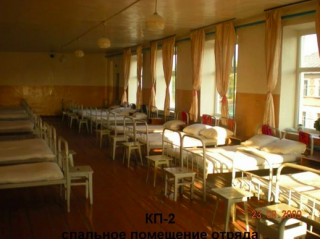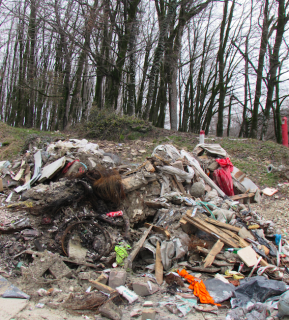
Arctic Frontiers: Disinformation, Security and the Northern Sea Route
Bellona held a seminar on countering Russian disinformation in the Arctic at the Arctic Frontiers international conference in Norway
News

Publish date: September 24, 2014
News
In a major and surprising legal upset, an appeal to free vocal anti-Olympic activist Yevgeny Vitishko – brought before the Krasnodar Regional Court by the prosecutors who jailed him– failed, and he’ll serve the remainder of his prison time, his lawyers and colleagues from the Environmental Watch on the North Caucasus (ENWC) said Wednesday.
EWNC further reported that Vitishko may now be moved from his present “settlement” prison colony in the Tambov Region, which is the lightest form of incarceration in the Russian penal system, to a work camp, which would mete out harsher punishment – though this could not be independently confirmed by press time.
Prosecutors themselves brought the appeal when they finally noticed several procedural mistakes in their February case against the activist, and bade the court to free Vitishko, who is serving a three year sentence for spray painting a fence – a crime other of his colleagues at EWNC and other witnesses say he did not commit.

According to his lawyer, Alexander Popkov, today’s appeal was the last legal opportunity to free Vitishko – and his continued imprisonment something of a surprise given the circumstances of the hearing.
The hearing was overseen by Krasnodar Regional Court Judge Igor Galkin, and that part of the prosecutor’s office that which wanted to see Vitishko free – was represented by Deputy Regional Prosecutor Valery Kruglov.
It was Krulglov who in July penned a letter – available on the EWNC website in Russia – to the presidium of the Krasnodar Regional Court, citing numerous violations of judicial process and a host of inconsistencies in testimony presented against Vitishko that secured his three-year incarceration.
Critical opportunity dashed
The hearing was a key moment in the Vitishko case, as it represented the first time that regional prosecutors stood up in the activist’s defense and declared his earlier sentence in 2012 by the city court of Vitishko’s hometown of Tuapse, 70 kilometers northeast of Sochi, to be baseless and illegal.
In that instance, Krasnodar prosecutors said, the court was wrong to when it decided to change a two year suspended sentence he was serving for allegedly spray painting a construction fence on federal lands surrounding Regional Governor Alexander Tkachev’s summer mansion to a three year custodial sentence.

As a rule, another of Vitishko’s lawyers, Marina Dubrovina, told Bellona in an email, such appeals filed by prosecutors are nearly always granted, and as such she expected to see Vitishko to walk free Wednesday.
Vitishko was also represented during the hearing by public defender Yelena Shmakova, who has been active in email list-serves in Vitishko’s defense.
Although the 40-minute hearing was open to the public and attended byVitishko supports from as far away as Moscow, including Sergei Mitrokhin, head of the opposition political party Yabloko, Vitishko himself was only allowed to be present via a scratchy closed circuit TV connection from the Sadovaya, or KP-2, prison colony in the Tambov Region.
And though the presentation of evidence pointing to errors in Vitishko’s original prosecution took most of an hour, Judge Galkin deliberated for less that two minutes before turning the appeal down, EWNC told Bellona.
Judge Galkin offered no reasoning to his decision.
“As shown by the results of the hearing, the influence on the regional courts exerted by the regional governor are more weighty that the legally founded appeal of regional prosecutors” said EWNC in a statement. “
Bellona is profoundly disappointed by this last round of government-driven insults against Vitishko, and the inestimable work he did to preserve the environment of the Krasnodar Region from destruction by the 2014 Sochi Winter Games. According to Nils Bøhmer, Bellona’s managing director, the Russian government has plenty of subterfuge to hide behind as it continues to railroad Vitishko and other NGO activists.
‘This shows that [President Vladimir] Putin is continuing to kill what is left of civil society in Russia in the shadows of the Ukraine crisis,” he said.

The EWNC report on irreversible ecological damage visited on the Krasnodar Region, co-authored by Vitishko and Goldman Prize laureate Suren Gazaryan, who fled Russia – remains a damning and classic testimony to Putin’s megalomaniac drive to host the Sochi Olympics at any cost.
Andrei Rudomakha, EWNC’s coordinator wrote that, “The purpose of this show is not only to break [Vitishko] personally but also intimidate other activists and hinder our struggle for civil rights and against corruption.”
Vitishko a ‘troublesome’ prisoner
While it remains unclear whether Vitishko will be transferred to a prison camp with a harsher regime, there is little doubt that the wardens of the Sadovaya colony would be only too glad to see him go.
Since he has been an inmate there, Vitishko has taken up the case of exposing mass beatings and harassment visited on convicts by guards, as well as guards’ attempts to blackmail convicts into ganging up on other convicts who pose inconveniences for the penitentiary staff.
He has also lobbied for better treatment of the prisoners, which has resulted in the installation of more telephones and easier access to using them and numerous other improved living conditions for his fellow inmates.

Bellona held a seminar on countering Russian disinformation in the Arctic at the Arctic Frontiers international conference in Norway

Our December Nuclear Digest, reported by Bellona’s Environmental Transparency Center, is out now. Here’s a quick taste of three nuclear issues arisin...

Bellona has launched the Oslofjord Kelp Park, a pilot kelp cultivation facility outside Slemmestad, about 30 kilometers southwest of Oslo, aimed at r...

Our November Nuclear Digest by Bellona’s Environmental Transparency Center is out now. Here’s a quick taste of just three nuclear issues arising in U...